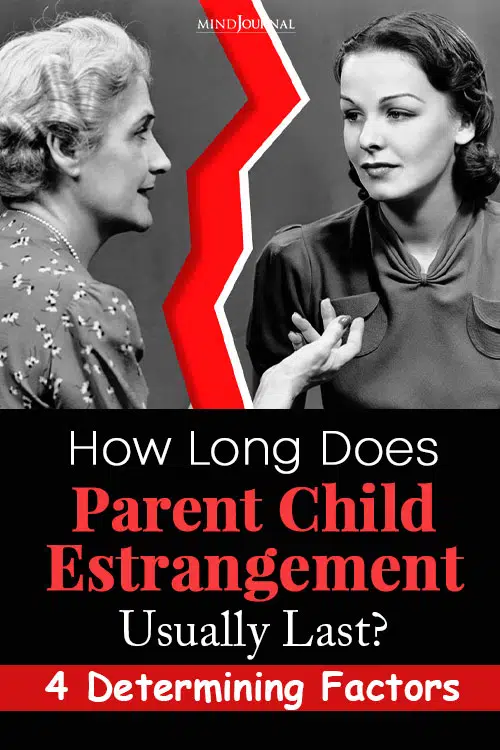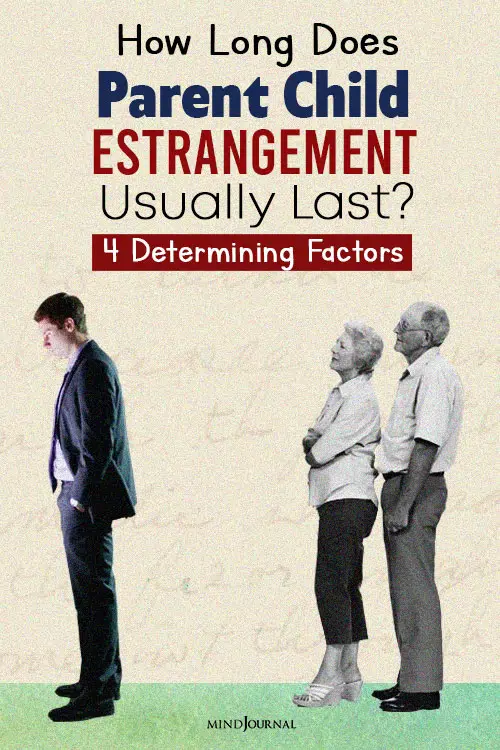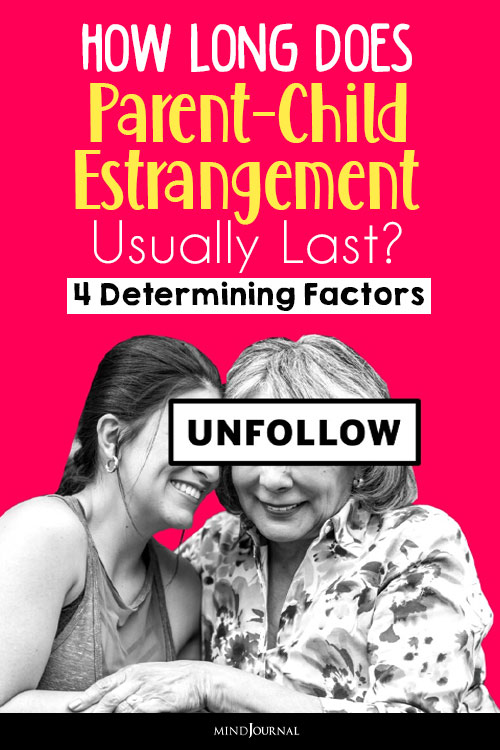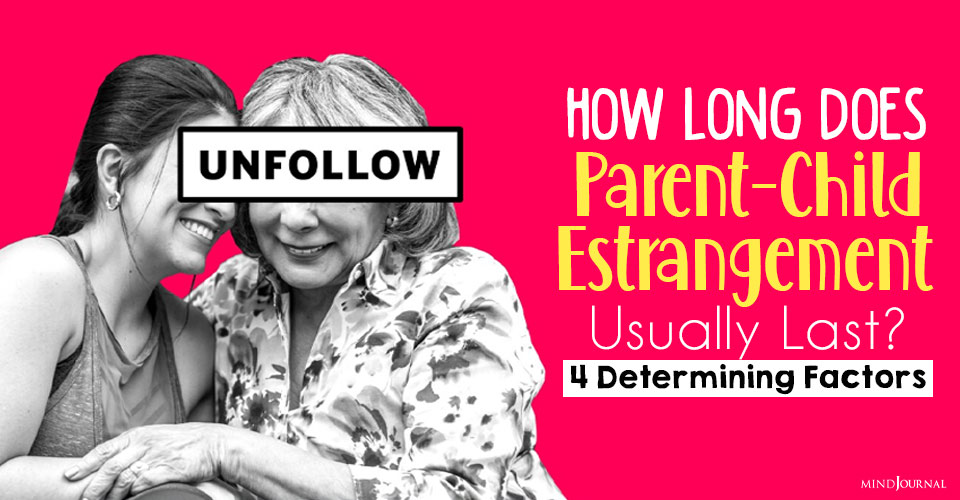Becoming a parent is a demanding job. As your child ages and gets into adulthood, the relationship changes though. A parent’s relationship with their adult children can change and become estranged. The most common form of parent-child estrangement is the result of children abandoning their parents. But what factors can explain this and how long does this parent-child estrangement last?
Parent-Child Estrangement: What do parents need to know when adult children cut them off?
Nine years, average. Five-plus years for mothers, seven-plus for fathers. Less than five years, in most cases. All of these timelines have appeared in various research studies on estrangement between parents and adult children. None is definitive.
How Long Your Estrangement From Your Child Lasts Will Depend On Several Factors.
And while only one of these is within your control, that’s not necessarily a bad thing.
Factor 1: Your Child
Your child’s temperament and circumstances will affect the length of estrangement. Let’s look at each of these.
Temperament
If your child is particularly soft-hearted or family-oriented, she’s more likely to look for reasons to reconcile. If he’s particularly stubborn, independent, or apt to hold grudges, he’s a harder case.
How well your child’s personality meshes with yours is another element that appears in the “temperament” column.
Circumstances
Your child’s circumstances play a larger role than you might think in how long the estrangement will last.
Busy young adults can easily put troubled relationships with parents on the back burner. They don’t have extra time or energy to spend working through things with people who remind them of the past. They’re naturally oriented towards the future—new relationships, careers, living situations, opportunities, etc.
What might have taken a good, long conversation or two to work through could take months or years to resolve. This is because of the fact that adults’ priorities typically don’t include moving “backwards,” i.e., closer to parents. Even if they love you, building an independent life takes precedence for most healthy young people.
Related: Why You MUST Cut Ties With A Toxic Family Member
Factor 2: Pressure
You may be surprised to hear this, but estranged adult children experience near-constant pressure to reconcile with their parents. There are two separate types of pressure on your child.
Social Pressure
Your child lives in a society that values family. Socially speaking, it will never be “comfortable” for your child to be estranged from you. Pressure to reconcile may come from your child’s spouse, in-laws, friends, coworkers, and even casual acquaintances.
When people find out your child doesn’t talk to you, many will encourage them to reconcile. It’s common for people to be uncomfortable when others cut off their parents. These folks will often make your child feel judged as ungrateful or unfeeling.
Internal Pressure
There’s often uncertainty around estrangement, even in those who initiate it. “Am I a bad daughter?” “Was I asking too much of my parents?” “Am I right to stay away?” Far from being on a power trip, estrangers are often plagued by insecurity surrounding their decision.
For many, it would be easier to reconcile and not have to struggle with these thoughts. The longer it goes on, the more exhausting this can be.
Related: Parental Alienation Syndrome: What Is It, And Who Does It?
Factor 3: Time
The passage of time changes everything. Time can heal, or at least soothe old wounds. It can usher in perspective as circumstances change and tables turn. There are dozens of wise old sayings about this. Suffice it to say, it’s impossible to step into the same river twice.
You and your child will both be different tomorrow than you were yesterday. And the more tomorrow pass, the more room there is for change.
Anger may have flared between you and your child in the past. But in time, memories will start to fade around the edges. Anger will ease off and reveal the hurt feelings beneath. Again: Perspectives can and do shift.
All of this happens only as time passes. You can go ahead and curse time for being a thief. But also remember to celebrate it as a helpful friend. I’ve heard of estrangements finally ending after more than 30 years. Time can work miracles.
Factor 4: You
Last but not least, what impact can you have on how long your child remains estranged? Plenty. And that cuts both ways.
It’s important to remain calm when your child initiates cut-off. Acting from emotion usually leads to poor results. While you may not be able to speed up reconciliation, you can always slow the process down, and the best way to impede progress is with impulsive, emotional behavior that serves your needs while ignoring those of your child.
Contacting an adult who has asked for space is a good way to force them further away from you. It will also prolong the estrangement since the request for space remains unfulfilled as long as you’re reaching out.
If you haven’t been asked for no-contact, your calm and loving response to your child’s distancing behaviors may help to draw him or her back into the conversation. You need to understand what went wrong, and how you can address the problem as The Parent.
No reconciliation will last if it’s not followed up with positive changes to the relationship. The best thing you can do with the time that’s been forced on you is to learn how to understand and address your child’s emotional needs.
People don’t estrange from parents on a whim, or just because someone else wants them to. If your child is willing to put distance between you, there’s something there for you to understand.
Related: What Is Positive Emotional Detachment: Definition and Meaning
Parents And Personal Growth
In most cases, there’s something invisible to the parent, that bothers the child about the relationship. For rejected parents, deep introspection and intentional personal growth can bring such issues to light. The better you understand yourself, the better chance you have of understanding your child.
Here are a couple of things you can do to enhance Factor 4 while you wait for the other factors to work on your child…
1. Don’t contact an adult child who’s expressly asked for no contact.
As I already suggested, it won’t go well for you. The most likely response will be either negative or none at all. You could easily prolong the estrangement unnecessarily.
2. Practice emotional literacy.
Far from being just distractions, emotions are the very basis of our quality of life and our enjoyment of relationships. If you’ve been disregarding or disrespecting the role of emotions in your life, it’s time to change that stance.
Related: Why Grown Kids Tend To “Ghost” a Parent’s Wedding
3. Notice how you feel.
Learn to embrace and tolerate every feeling you might have. Once you start paying attention and honoring your own feelings, you’ll understand and respond to others’ emotions with greater ease. Practice constructive wallowing.
4. Cultivate social support.
Your child isn’t there for you right now. But that doesn’t mean you have to be alone. Seek the company of people who accept, understand, and love you. This is not a nice-to-have. It’s a need-to-have, for your physical and emotional well-being.
5. Get therapy.
If you’re not already in therapy, find a compassionate counselor who can help you understand your history and current experiences. Getting clear on these will not only make you feel better about yourself but will put you in a better position to understand your child when the time comes.
You are the fourth and final factor in how long your estrangement will last. The other three might bring your child back to you even if you do nothing. But reconciliations that occur without an intentional change in the parent usually fall back into estrangement eventually.
Do whatever you need to heal and grow as an individual now. It will help you get to the bottom of why the relationship faltered in the first place. You’ll also become more adept at solving any problems that need solving between you and your child.
References Lucy Blake, “Parents and Children Who Are Estranged in Adulthood: A Review and Discussion of the Literature,” Journal of Family Theory and Review 9 (December 2017): 528. Richard P. Conti, “Family Estrangement: Establishing a Prevalence Rate,” Journal of Psychology and Behavioral Science 3, No. 2 (December 2015): 34. Kristina Scharp and Rachel M. McLaren, “Uncertainty Issues and Management in Adult Children’s Stories of Their Estrangement with Their Parents,” Journal of Social and Personal Relationships 35, No. 6 (2017): 812
Written By:Tina Gilbertson Originally Appeared On:Psychology Today Republished with permission











Leave a Reply
You must be logged in to post a comment.